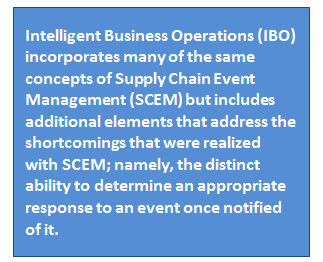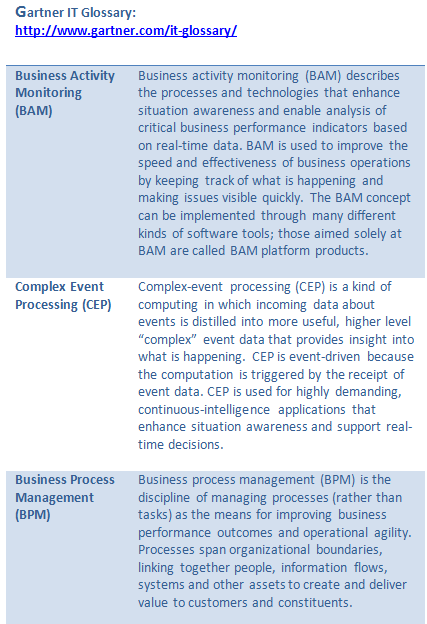“Many business process directors are under pressure to help make the best possible process-related decisions to ensure desirable business outcomes, business differentiation and continuous innovation.” Sinur J., Schulte R., “Use Intelligent Business Operations to Create Business Advantage” Gartner Research, 20 March 2013
Nowhere is this statement more applicable than in the supply chain. While the inventive concept of Intelligent Business Operations (IBO) is gaining traction in multiple functions and process areas, the applicability and potential is particularly high within supply chain management.
Intelligent Business Operations Delivers the Benefits Promised by Supply Chain Event Management
Supply Chain Event Management (SCEM) first emerged as a hot topic in 1999, peaking in interest in 2001, only to fall away into obscurity. It has resurfaced recently, but centers around transportation execution requirements such as track & trace. Several factors played a role in the rapid rise and fall of SCEM as a topic, including the fact that SCEM was part of the .com bubble and that the appreciation of the benefits of sharing information between trading partners was a very new concept. But the major factor in its demise was that it was treated as an add-on to planning systems rather than as an integral part of planning systems. At the time, the generally accepted process coverage of SCEM included measure, monitor, notify, simulate, and control; however, the more difficult parts of simulate and control were never realized because this required them to be integral parts of the planning systems.
As a result, SCEM solutions were little more than alerting mechanisms flooding users’ inboxes with hundreds of messages which were of dubious importance and provided no mechanism for evaluating the resulting impact of the event on the wider supply chain, nor identifying the people that should be notified about such impacts. And, very importantly, there was no way to generate actionable responses to the events. The reemergence of SCEM within the transportation execution space has been as embedded capabilities within transportation management solutions (TMS), and are providing valuable advantages even though the events being tracked are very limited. The benefits to be realized from SCEM concepts have not diminished since their early inception in the late 1990s. In fact, because the early solutions never got past the monitor and notify capabilities and the recent reemergence in TMS is so narrow in focus, the benefits remain largely untapped; one of the most significant ones being improved customer service at lower cost. Even more intriguing though is the emergence at Gartner Research of Intelligent Business Operations (IBO) which incorporates many of the initial SCEM concepts in the broader context of any process. According to Gartner (Sinur J., Schulte R., “Use Intelligent Business Operations to Create Business Advantage”, Gartner Research, 20 March 2013),
IBO is an emerging style of business behavior that leverages analytics embedded in processes to support better decision making and improved knowledge worker collaboration. IBO-based processes are "smart" about the context in which they run, which is influenced by events external to the process.
Interestingly, all the fundamental capabilities of measure, monitor, notify, simulate, and control of SCEM have been included in IBO. While not directly transferable, the ideas are largely represented (and have been extended) in recent IBO-related concepts such as
- Business Activity Monitoring (BAM) instead of Measure and Monitor,
- Complex Event Processing (CEP) instead of Notify, and
- Business Process Management (BPM) instead of Control.
More important is the application of IBO in the wider contexts of strategic, tactical, and operation planning, not only in execution. In addition, the inclusion in IBO of Constraint Based Optimization (CBO) and Simulation capabilities as core requirements address the initial short comings of SCEM, namely the ability to determine an appropriate response to an event. What is not captured explicitly in the definition of IBO is the need to create the initial plan against which performance will be measured. If the capabilities used to determine an appropriate response to an event are different than those used to generate the initial plan, then it is unlikely that the response will satisfy the business goals of the organization. (Of course in certain circumstances, the business rules used to address an exception are different from those used to plan and manage operations under normal circumstances.) The separation of planning from event management was the key weakness of early SCEM concepts, which was exacerbated by the narrow focus on execution, ignoring the rich opportunities in all levels of planning. We should not repeat the same mistakes. To learn more about this topic, feel free to view the complimentary Gartner Research report featured in the Kinaxis newsletter: How to Use Intelligent Business Operations to Create Business Advantage (Sinur J., Schulte R., Gartner Research, 20 March 2013). And, be sure to keep an eye out for part 2.






Discussions
I found an interesting article about the Carrefour Supply chain strategy.
This article based on Q&A of Roberto Canevari, Head of Global Supply Chain at Carrefour.
www.logiconeurope.com
Leave a Reply